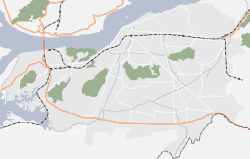Basistha Temple
Hindu temple in Assam From Wikipedia, the free encyclopedia
Basistha (Pron: bəˈsɪsθə) temple, located in the south-east corner of Guwahati city, Assam, India, is a Shiva mandir. The history of the Basistha Ashram where the temple is located dates back to the Vedic age. According to legend the ashram was founded by the great saint Basistha (Vasishtha).[1]
This article needs additional citations for verification. (September 2009) |
| Basishta Temple | |
|---|---|
 Basistha Mandir | |
| Religion | |
| Affiliation | Hinduism |
| District | Guwahati |
| Deity | Shiva |
| Location | |
| State | Assam |
| Geographic coordinates | 26°05′42″N 91°47′04″E |
| Architecture | |
| Type | Nilachal architecture |
| Creator | Rajeswar Singha |
| Completed | 1764 |
Temple in the ashram stands on the bank of the three mythical mountain streams-Sandhya, Lalita, Kanta- originating from the hills of Meghalaya, which becomes the rivers Basistha and Bahini/Bharalu flowing through the city.[2]
Basisthashram

This ashram is believed to be the home of sage Basistha. The ashram is located a few kilometers (10-12) from Guwahati, on the outskirts of Garbhanga reserve forest which has a population of elephants. This Garbhanga reserve forest is also a proposed butterfly reserve. Although the ashram has a temple but still the cave in which the Muni Vasistha is believed to have meditated is located 5 km inside the ashram. The ashram also has a waterfall.[2]
History
The brick temple was built in mid 18th Century. It is an octagonal shaped temple at the base with a polygonal sikhara over it. The temple has a sunken garbhagriha which is believed to have the foot impression of the sage Vasistha, who is believed to have had his asrama in this area in the remote past. The existing octagonal brick temple was built by Ahom king Swargadeo Rajeswar Singha during his period of reign from 1751 to 1769.[3]
References
Wikiwand - on
Seamless Wikipedia browsing. On steroids.

